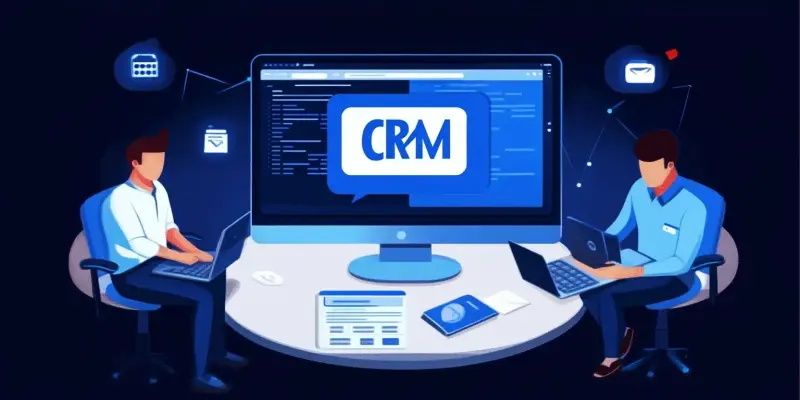In today’s business landscape, Customer Relationship Management systems have become almost indispensable tools, with over 80% of sales and marketing professionals relying on them to streamline operations. Despite their widespread adoption, however, a startling revelation is that only 31% of users feel their CRM systems meet their needs. The dissatisfaction is primarily attributable to the complexities, frequent disruptions, and exorbitant costs associated with existing CRM solutions. This article delves into the multifaceted challenges businesses face with their current CRMs, reveals the negative impact on key performance metrics, and explores the need for simpler, more effective alternatives.
The Strains of Ineffective CRMs on Business Performance
Recent findings from a Workbooks report highlight the significant negative impacts that inadequate CRM systems have on a company’s critical performance metrics. For businesses, the consequences of operating with subpar CRM systems stretch beyond mere inconvenience. Users who are satisfied with their CRM systems outperform their dissatisfied counterparts in crucial areas such as lead generation and pipeline management. Specifically, satisfied users score 5.9 out of 10 in lead generation effectiveness and 7.6 out of 10 in pipeline management compared to 4.9 and 5.7, respectively, for dissatisfied users.
These performance metrics demonstrate the clear benefits of an efficient CRM system. Despite this knowledge, many businesses find themselves feeling trapped by their current setups. Nearly 62% of sales and marketing leaders report feeling stuck due to the various challenges and perceived risks of switching to a new system. Key concerns that exacerbate this feeling of entrapment include potential disruption to staff, cited by 55% of respondents, the high cost of transition, noted by 45%, and the considerable time investment required, highlighted by 36% of participants. Furthermore, the inherent complexity of CRM technology poses a significant barrier for 45% of the respondents, compounding user frustration and hindering optimal business operations.
The Demand for Simpler, User-Friendly CRMs
Given the widespread dissatisfaction and the impediments to performance caused by complex CRMs, there is a growing demand for more streamlined and user-friendly alternatives. The Workbooks report indicates that 77% of respondents now consider ease of use as a primary factor when selecting a new CRM system. Additionally, 46% of the survey participants prioritize systems that can deliver a quick return on investment (ROI). Despite some incentives for making the switch, such as improved customer support and more flexible cost structures, 31% of CRM users continue to demand better services, and 23% seek lower costs.
These statistics underline the fact that current CRM offerings have been falling short of user expectations. Consequently, many businesses are actively exploring alternative solutions. The existing dissatisfaction prompts a call for better-designed CRMs that can offer advantages such as simplicity, lower costs, and immediate benefits without the disruptions that render a transitioning process seem unmanageable. With the proper management strategies, organizations can successfully navigate CRM transitions, witnessing meaningful improvements in performance.
Effective CRM Transitions and Their Benefits
Disruption, risk, cost, and time commitment are undeniably significant concerns when considering a switch to a new CRM system. Among these, disruption rates the highest across respondents, with a score of 7.6 out of 10. Nevertheless, companies that successfully manage the transition often see substantial gains in overall performance. A pivotal element of a smooth CRM transition is a robust change management strategy. Comprehensive staff training is also crucial in ensuring long-term adoption and effectiveness of the new system.
Dan Roche, Chief Marketing Officer at Workbooks, emphasizes that the importance of effective CRM systems cannot be overstated, especially for sales and marketing leaders who juggle dual roles. The research underscores that although the process of switching CRMs may seem daunting, the advantages far outweigh the challenges. Enhanced performance across various business functions is achievable, provided that transition is managed effectively with ample training and support.
Conclusion: Towards a Better CRM Future
In today’s business environment, Customer Relationship Management (CRM) systems have become nearly essential tools, with over 80% of sales and marketing experts leveraging them to optimize operations. Despite their high adoption rate, it’s surprising that only 31% of users believe their CRM systems are truly effective. The primary reasons for this dissatisfaction include the systems’ complexity, frequent interruptions, and high costs tied to existing CRM solutions. This issue-driven article examines the various challenges businesses encounter with their present CRMs, highlights the adverse effects on crucial performance metrics, and emphasizes the pressing need for more straightforward, efficient alternatives. Specifically, it considers how these complexities lead to wasted time and money, and how simpler CRM options could provide a better return on investment. Streamlining CRM systems could significantly enhance user satisfaction and overall business performance, driving a more seamless integration into daily operations.

